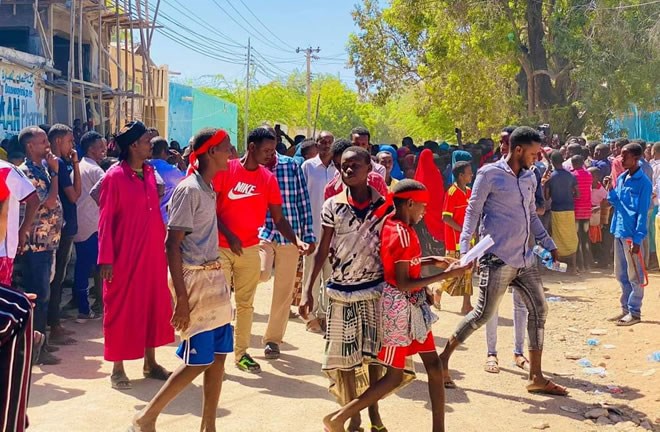Sunday, January 10, 2021
By Asha Kin F. Duale

Residents in Belet-Weyn protesting against Hirshabel's disputed election
The ways in which countries that had recently emerged from social upheaval into more democratic forms of rule chose to confront – or not to confront – their less democratic pasts differ significantly.
Usually, a major source of discord is a disputed election outcome; it triggers a political and institutional crisis out of which armed groups might further exploit to undermine the state.
In the case of Somalia, the 1969 bloodless revolution, the military force overturned the civilian state accused of rigged elections and corrupted governance. They established a very centralized system for 21 years that wiped out all resemblances of democratic elections.
The military regime employed a strategy of correcting the civilian government’s corrupted system by setting up an authoritarian one and completely halting any elections, whether fair or rigged.
This seems a relatively straightforward process. However, the current climate for the 2021 s/election of the Parliament and the President appears deeply frightening.
Firstly the chosen indirect election system empowers a clannish system of political representation. What is the narrative deployed here? Time constraint or deliberate strategy of delayed timetable?
Secondly, Somalis in the early 2000s have chosen the 4:5 power-sharing system hoping to quell the clan’s grievances on fair political representation.
Although this was a temporary ‘gentlemen’s agreement’ with no legal basis, it has become a convenient electoral system. The 4:5 system will be once again employed for the third time in the upcoming s/election of the next Parliament, and the s/election of handpicked and favourable Members of Parliament is of vital importance for anyone who is seeking the President’s seat.
This is why and how the Hiiraan region becomes a pawn in the governments’ hands. Hiiraan region as the sole surviving region out of the eight original regions witnessed during the military regime, splitting the remaining seven into 17 regions. What were the narratives of this historical injustice?
Hiiraan is the only territory in the whole of Somalia that can claim the legal status and definition of a region’ because the 17 ‘pseudo-regions’ are indeed a fraction of the original seven. The architects of federalism paid no regard to this fact in the narratives of shaping the Hirshabelle State 1 and 2.
The government decided that Hiiraan must merge with Middle Shabelle and form the HirShabelle State in 2016. Were the Hiiraanian people on board on this partnership? The narrative employed by the Somali government was the implementation of the impeding s/election that made possible the election of President Hassan Sheikh.
I cannot claim reporting all facts that made the Hirshabelle State the only failed state within the federal system of Somalia to date.
However, facing the prospect that by Feb. 2021, a new President or the current one has to be sworn to the highest office, the strategy employed here is to rush up again the establishment of Hirshabelle State 2.
But this time, coercing the Hiiraan region into a phony partnership has backfired. Ordinary people have rejected the Federal government’s s/election of HirShabelle Parliament and its President.
People demonstrated for days and continue to do so. Still, the government tried to crush it through arbitrary detentions and excessive force, including live bullets from the local police and AMISOM troupe. These actions amounted to a violation of constitutional safeguards, and the culture of impunity is no more in a democratic society.
Civil society organizations, elders, women, young people, and ad hoc formed armed groups voiced grievances requesting regional autonomy and total severance of any political ties with Hirshabelle State 2.
They are now demanding the redress of 48 years of historical injustice.
Several options are on the table for anyone who would try to mend this injustice:
1) According to Art 9 of the Provisional Constitution, the Hiiraan region owns the legal argument of special legal status. It is the sole region (out of 17 fragments of the seven original regions) that has retained the legal definition and title. Just like Mogadishu, the capital city, the Hiiraan region should be conferred a special legal status. This is the legal remedy of 48 years of inflicted unfairness that would enable the Hiiraan region to establish its own regional autonomy.
2) As per Art. 48(2) Hiiraan region would opt to submit itself for two years to the Federal Ministry of Interior administration, thus allowing time for reconciliation and reaching a consensual decision for any future partnership.
3) By validating the 2012 Presidential decree that divided Hiiraan into two regions: Hiiraan and Upper Shabelle regions, it will establish a new federal-state (Hiiraan State). This will be in harmony with the Provisional Constitution on the two regions’ partnership requirement.
Any reconciliatory process inclusive and not dominated by the Federal and Hirshabelle entities will consolidate talks on equal footing. It will also facilitate reaching a consensual solution on all the grievances against the Federal and Hirshabelle political establishment.
I conclude by stating that history has always shown leaders never gave action on inequality but come through people’s organizing.
The current government and future administrations have to accept that it is up to the Hiiraan people to decide upon their fate.
Asha-Kin F. Duale
Human Rights Lawyer
Duale Law & Consultancy Firm
Mogadishu, Somalia